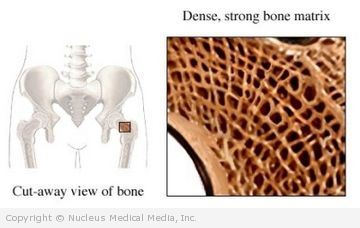(Osteitis Deformans)
Paget’s Disease – Definition
Paget’s disease is a chronic condition that results in enlarged and deformed bones. Although any bone in the body may be affected, the most common sites are the spine, skull, pelvis, thighs, and lower legs. The disease does not usually spread to other normal bones.
Paget’s Disease – Causes
Paget’s disease is caused by a malfunction in bone formation. Normally, bones are constantly being broken down by cells called osteoclasts, and rebuilt by cells called osteoblasts. With Paget’s disease, bones are broken down abnormally fast, and new bone replacement is loose and bulky, instead of strong and compact. These poorly formed bones may become weak, and may bend over time.
The exact cause of this bone malformation is unknown, but it is associated with heredity. Some experts believe that Paget’s may be triggered early in life by a viral infection.
Paget’s Disease – Risk Factors
A risk factor is something that increases your chance of getting a disease or condition. Risk factors for Paget’s disease include:
- Family history of Paget’s disease, especially in a parent, sibling, or child
- Race: Anglo-Saxon, European
- Age: 40 or older
- In US, residence in northern states
Paget’s Disease – Symptoms
In the early stages, most people have no noticeable symptoms. In later stages, symptoms may include:
- Swelling or deformity of a limb
- Increased head size
- Bowing of a limb
- Curvature of the spine
- Chronic bone pain, especially legs, hips, or spine
- Frequent fractures
- Problems with walking or gait
- Headaches, facial pain, or hearing loss when the skull bones are affected
- Swollen or painful joints due to damaged joint cartilage
- Numbness, tingling, pain, or weakness from pressure on nerves
Depending on the bone site, Paget’s disease may result in:
- Arthritis, usually osteoarthritis
- Carpal tunnel syndrome
- High calcium in blood
- Kidney stones
- Hearing problems (common)
- Dental problems
- Rarely: eye problems, congestive heart failure, bone cancer (sarcoma)
Paget’s Disease – Diagnosis
The doctor will ask about your symptoms and medical history, and perform a physical exam. Tests may include:
- Blood tests — such as those for alkaline phosphatase or calcium
- X-ray — a test that uses radiation to take a picture of the bones
- Bone scan — a series of pictures of bones taken after injection of a small amount of radioactive material
Paget’s Disease – Treatment
It is best to begin treatment as soon as possible. Treatment options include:
Medication
Medications may include:
- Pain medicine — such as acetaminophen (Tylenol) or nonsteroidal anti-inflammatory drugs
- Bisphosphonates — usually by tablet or by injection
- Calcitonin — administered by injection or nasal spray
Surgery
Surgery may be required if you have one of the following conditions:
- Bone fracture
- Severe degenerative arthritis
- Bone deformity
Self-Care
Recommendations include:
- Calcium, usually about 1,000-1,500 mg per day
- Adequate exposure to sunshine to promote vitamin D production in the skin (but limit time in the sun to prevent sun burning, wrinkling, and aging)
- Intake of adequate vitamin D, usually about 400 mg per day (more may be needed in older people)
- Regular exercise to maintain skeletal health, joint mobility, and normal body weight
- Avoidance of excess mechanical stress on involved bones
- A splint for an area at high risk for fracture
Paget’s Disease – Prevention
There is no known way to prevent the onset of Paget’s disease. People with primary family members who have Paget’s disease are encouraged to have a routine alkaline phosphatase blood test every two to three years after age 40.

